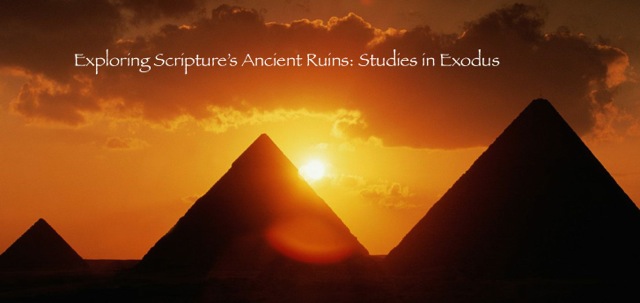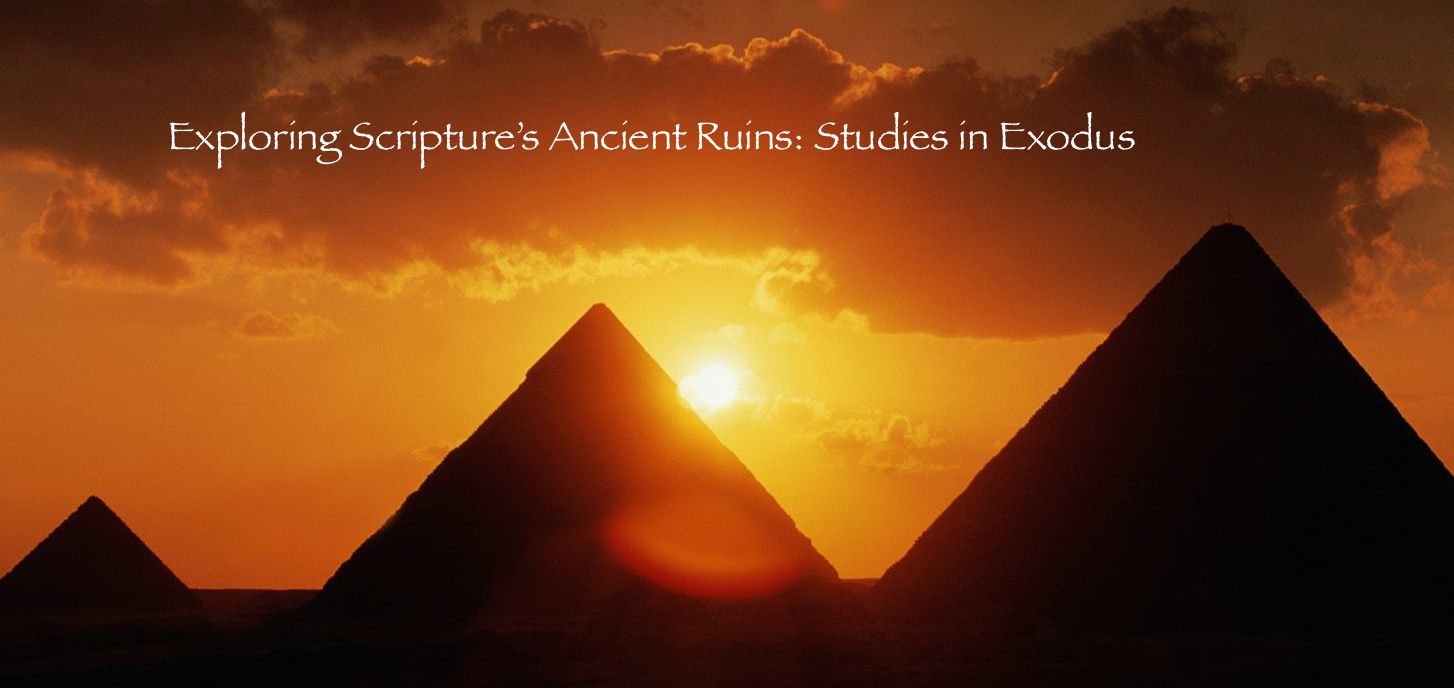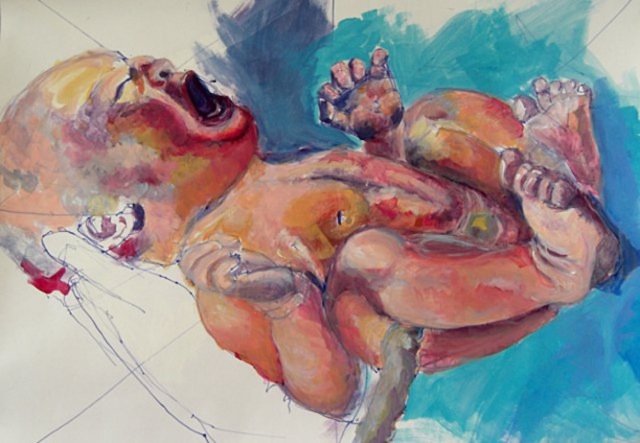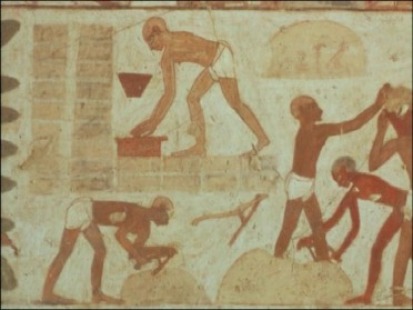
©1998-2015
Fellowship at Cross Creek
Life of Moses
Lesson 31
Sustainable Shepherding…
Ex 18:1ff
5.17.15
Introduction…At first glance this study do-over from 2003 didn’t seem to connect with me much until the application at the end, and then it was like being hit with a bullet right between the eyes—deadly convicting. Why the sudden impact? Because we all have lots to do, or it seems that way at times. Well, so did Moses as he was leading the Children of Israel from their former Egyptian bondage and persecution through the wilderness to their Promise Land destiny. Can you imagine all the logistical nightmares and conflicts between three million people attempting to migrate from one corner of the world to just around the block? The task had to be daunting, and there was NO current leadership or management structure in place. No doubt there were tribes and families, and enough organizational structure to fight battles with, which they had just done with the Amalekites, but apparently, something more was needed—a system of administrative courts or judges or leaders where tasks could be meted out and problems resolved.
Is this not our lives, perhaps not so much with younger children, but certainly as they get older and have assignments to finish, chores to get done, problems and conflicts to solve, desires to fulfill and goals and dreams to ponder? And how does one manage all this? I am a perpetual list maker. I have lists on my marker board at church, on my marker board at home, in my little notebook that I carry with me and in my larger notebook that I carry in my backpack. I can make a list of fifty to hundred things to do in minutes. Sometimes, my lists overwhelm me and I want to run away from them because they seem never to get done. Some of the things on my list are overwhelming. I write them down like they are no big deal, and then over time come to realize that these desires or tasks may take years, even decades, to accomplish, as some have taken, and still others are still waiting to be checked off my list. Thus, I am not always so discerning about my lists. And my lists are not just about accomplishing impersonal things. In fact, many of them have to do with people, which may include difficult questions or conversations—some of these conversational approaches I must prayerfully incubate for days, weeks, months, even years.

So why do I think in endless lists and conversations with people that may take years to accomplish, if ever? Because I live. In fact, we all live… in what is now an imperfect world. Things break. People are broken. Relationships are broken. And as God’s redeemed and maturing ministering spirits or sons, this IS our task in a post-Eden fallen culture. It was once to manage a perfect garden with a helpmate, which I am not sure how all this looked or took shape, but that has now all changed.
Now we fight; now we work, and then rebel, sneak, lie, cheat, as well as, attempt to build productive coalitions that hopefully attack the never-ending, viral and devastating effects of evil or sin unleashed on a foolishly, naïve culture. In fact, I had a public defender, a very good one, tell me recently that if he could take away alcohol and drugs, there would be no need for public defenders. Almost all crime can be traced back to this slippery pursuit of immediate. short-term pleasure. Well, we tried taking away the alcohol for the very same reason several generations ago, and well, that was certainly an experiment in rearranging life’s moral clutter.
Bottom line: we all can have a lot to do because the world and people need managing and attending to, and if we are to do it well or with passion, we will have a lot to do, and if we have any hope of enduring, as we do it, we will need help.
And as his children, we have been given the basis for that help in our Spiritual Nanny or Tutor of sorts, His Spirit, but no doubt both within Israel’s vast journey within the Old Testament and the Church’s within the New Testament and beyond, the Holy Trinity of Relationship, the Godhead, Three in One, has determined that its children will perform their task of subduing or managing a fallen creation and culture—as brothers and sisters, learning to die to our sin an and selfishness, and, with the help of the Spirit, learning to work together as a team for a common Spiritual good in Christ.
A part of this study is about learning how to manage that Spiritual team of energy, vision, mercy, hope, love and passion effectively. Thus, whatever purpose God’s Spirit is leading you to shepherd, serve or grow with, don’t discount the purpose or value of Jethro’s wisdom to his son-in-law because whether you realize it or not, you are Moses in a fall world…with a whole lot to do, and if you think about it, probably more than you could ever imagine.
Your servant,
jc
General Introduction: Moses, led by God, is leading the children of Israel, perhaps as many as 2-3 million strong, away from Egypt and closer to the land promised to the forefathers many centuries before. But their journey is not without its problems. Last week God via Moses’ staff delivered the Israelites from two enemies: a lack of water and the fierce Amalekites.
This week Moses while attempting to solve all the Israelites problems is given a great piece of wisdom from his father-in-law who has brought out Moses’ wife and children to meet him.
Recent Studies…
Israel sing out its praise to Yahweh of Yahweh God’s delivering Israel from utter annihilation at the hands of Pharaoh’s massive army. Ex. 15:1ff.
After healing Marah’s bitter waters, Yahweh tests Israel with a lasting ordinance—if you keep my laws, I will keep you safe from all the things that the Egyptians feared. Ex. 15:22ff.
Now, with their backs seemingly up against another wall–the wall of daily sustenance in the desert, the whole community rises up to turn its collective fear and complaint towards God’s servants. Ex. 16:1ff.
In turn, along with the introduction of the Sabbath, a weekly day of rest, Yahweh meets his complaining children’s desperate needs with the remarkable daily provision of manna. Ex. 16:19-36.
Via the staff Yahweh had provided Moses with, God delivers Israel from two fierce enemies; a scarcity of water and the Amalekites. Ex. 17:1ff.
Israel has her first ally on her way from Egypt to her Promise Land, Moses’ father-in-law, apparently an important Midianite priest. Ex. 18:1ff.
Pray for Insight…
Read Passage several times…
Ask Questions…
18:13 The next day Moses took his seat to serve as judge for the people, and they stood around him from morning till evening.
Why was Moses judging the people by himself? Isn’t it strange? Why we would not think that 2-3 million people living and traveling together in the desert would not have a myriad of problems? After all they were people just like any other people. What kind of problems were they bringing him? Note: they had no law at this moment in time. They also had no organizational structure outside the tribal leadership.
14 When his father-in-law saw all that Moses was doing for the people, he said, “What is this you are doing for the people? Why do you alone sit as judge, while all these people stand around you from morning till evening?”
This could not have been fun to sit in this line all day—about like waiting in line at an amusement park on or West Highway 76.
15 Moses answered him, “Because the people come to me to seek God’s will.
At least this is God, if they want to know God’s will. Why would Moses know the answer to every situation? Did he pray? Did God answer? Why didn’t God tell him that there was a better way or was God doing that through Moses’ father-in-law?
16 Whenever they have a dispute, it is brought to me, and I decide between the parties and inform them of God’s decrees and laws.”
How did Moses know God’s decrees and laws? After all just a short while before, he was just a nomadic shepherd tending his sheep in the desert when he saw the burning bush.
17 Moses’ father-in-law replied, “What you are doing is not good.
18 You and these people who come to you will only wear yourselves out. The work is too heavy for you; you cannot handle it alone.
19 Listen now to me and I will give you some advice, and may God be with you. You must be the people’s representative before God and bring their disputes to him.
20 Teach them the decrees and laws, and show them the way to live and the duties they are to perform.
A huge principle…teach them the decrees. Don’t keep them dependent upon you. Teach them how to think spiritually.
21 But select capable men from all the people –men who fear God, trustworthy men who hate dishonest gain –and appoint them as officials over thousands, hundreds, fifties and tens.
Just like in the army—brigades, regiments, companies and platoons. Why both the hundreds and fifties? This sounds a little redundant.
22 Have them serve as judges for the people at all times, but have them bring every difficult case to you; the simple cases they can decide themselves. That will make your load lighter, because they will share it with you.
Just like our court system today with its smaller courts and it supreme courts, both state and federal. I like the concept of sharing the load.
23 If you do this and God so commands, you will be able to stand the strain, and all these people will go home satisfied.”
You won’t crash and they will go home satisfied. For one reason they won’t have to wait all day for a small decision.
24 Moses listened to his father-in-law and did everything he said.
Why? Why had he not thought of this before? Or had the courage to implement it?
25 He chose capable men from all Israel and made them leaders of the people, officials over thousands, hundreds, fifties and tens.
26 They served as judges for the people at all times. The difficult cases they brought to Moses, but the simple ones they decided themselves.
27 Then Moses sent his father-in-law on his way, and Jethro returned to his own country.

Who? Moses, judge, the people, father-in-law, God, the parties, representative, capable men, men who fear God, trustworthy men, officials over thousands, hundreds, fifties and tens, judges, capable men, all Israel, leaders of the people, Jethro.
Where? Around him, to me, home, from all Israel, on his way, to his own country.
When? The next day, morning till evening, whenever, now, at all times, at all times, then Moses sent his father-in-law.
What?
• Moses takes his seat to judge the people who waited the entire day.
• When Moses’ father-in-law sees this very inefficient and staggering load he asks Moses why?
• Moses responds that the people come to him seeking God’s will in their disputes, and he informs them of God’s decrees.
• Moses’ father-in-law challenges Moses that what he is doing is not good. They will both wear out.
• Moses’ father-in-law suggests to him to teach the people’s God’s laws and show them how to live.
• But first he must select capable, trustworthy men who are not corruptible from the power that they are about to receive.
• Men from all over the nation and appoint leaders of thousands, hundreds, fifties and tens.
• Let them decide the simpler cases and those they can’t, then have them bring them to you.
• You will be able to stand the strain and they will not grow frustrated and tired for having to wait so long.
• Moses implanted his father-in-law’s advice and then sent his father-in-law back on his way home.
Summary…When have one of our first great leadership lessons in the Scriptures: the selection of capable, honest leadership and administration of God’s kingdom. Teach people the law and how to apply it; then select very capable, godly, non-corruptible men to manage the decision making among the Israelites.
Why? (What truths do I learn about God, man, people, myself, life?)
• People are imperfect and not objective and therefore need leaders, rulers, judges, etc. to arbitrate their differences. In other words, as much as we hate to admit it, we need the referees.
• Sometimes we and even good leaders will try to do way too much, rather than delegate or ask for help, perhaps fearing people will turn us down or will not do as good a job as we would.
• There are more problems than we can imagine in the world. People are sinners.
• Jethro affirmed Moses’ ultimate responsibility to represent the people to God. He just gave him a better way to do it.
• Jethro advised and Moses followed through with the selection of capable, godly, non-corruptible men.
• This also has to be built on the foundation of Godly teaching, or a teaching of the underlying principles and foundations. The truth + capable leadership.
• Jethro and Moses also built a pyramidal appellate system for the more difficult cases.
• Jethro stayed long enough to see the system working fine.
• God had a purpose in bringing Jethro to his son-in-law. God uses people to give good counsel to other people.
So What?
2003 Application…
Struggle? Getting all the new Bermuda grass planted, watered and established properly, rocks and all.
Truth? God’s word teaches that via a combination of the theory and delegation, I should be able to accomplish a difficult task.
Application? I have used this system with respect to Sunday mornings, worship, home churches, the Learning Center and constructing our church. Now I am trying to make it work with respect to our Youth, Outreach, Visitor follow-up and assimilation into our Body, Facilities and Grounds, teaching and writing.
Show me how, Lord. Show me how. Show me the way. Give me my Jethro. Show me the light. Send me the help as well as the capable men to help me accomplish your goals for our church. I ask this mercifully in your son’s name.
2014 Update and Application…This is good to reflect back because so often we don’t. We just ignore or forget, but this forces me to ask and answer what did I learn in the intervening twelve years? Are things different? Did things change? How have I changed? Did I change or am I, as I have been noted of saying from time to time, just rearranging the same old furniture or clutter, or did things because of my faith, study and attempt to apply what I was learning change me or my life?
With respect to the grass, it did get planted, and it has been maintained over the years. Without water, the cool season has struggled mightily, and I mean mightily. And actually the warm season Bermuda appears like a motley mess right now. It’s been fertilized, but I am experimenting with NOT killing all the clover, henbit and chickweed, among other intruders. My assumption is that as things heat up, those varieties will die out, and the Bermuda may have more of a chance. But there does seem to be a threaded theme in much of what I do and that is without enough of the resources to get the job done, we get by. It’s not the best, and it’s not the worst. It could be much better, but it ain’t bad. So we continue on, in hopes of one day, who knows? And if not, then it was a great run, and by process of elimination, we learned a lot…a whole lot. Perhaps those behind us will do a better job.
As far as applying all this to my administering the church’s many tasks, I would say it is about the same as my managing the grounds. It could be much better, but it ain’t bad. At least it’s real. There are so many good people taking the initiative to do so many good things, within the body, the community and within their own families, and yet we still have our ministry holes, but at least what we do and who we are is for the most part NOT FAKE. It is the Real McCoy, and as far as heaven is concerned, I think that is far far more important. Our Father knows our maturity and immaturity, and he is present through his Spirit. We are dynamic, meaning NOT static, and what God wants to do with us, is his business and for his glory and purposes. Our responsibility is to seek Him and be obedient to his Spirit’s leadership as best we can. We leave the results and the bigger picture up to God. Amen.
So have I or we changed? Yes. Still making mistakes? Yes. Still learning the fine art of growing healthy sod or sheep? Absolutely. And thank God for his grace, blood, mercy and forgiveness because without it, we would be one self-condemned mess, but with it, we persevere…we grow…we learn…we love…we hope…we strive…we trust…we cry, laugh, grieve, believe, confront, teach, challenge, listen, serve, inspire, forgive, seek to understand and Spiritually influence and our certainly disciplined…we are. We are his beloved children, not based on our own righteousness, but his, and still growing up…

Thanksgiving…Seemingly a wonderfully productive day yesterday. Lots of variety… writing in the morning, pastoral visitation, listening to and loving on older people, finding and figuring out, with some prayerful help, believe it or not, how to get a new mowing belt on the church’s lawnmower, which was not easy due to the belt’s tension, then finishing up mowing the church’s grounds, then coming in late, and after taking a much-needed shower, watching an old tear-jerker WWII propaganda movie, the White Cliffs of Dover, with my wife, and then just having some special time with my wife as we ended our day, as well as, getting to read a chapter of the Washington biography that I am currently reading on…very slowly, which is so incredible, both in research, composition and subject matter. Last night, among other things, I was reading about Washington’s siege of Boston in 1775, with little to zero ammunition and countless obstacles to overcome, including short-term enlistments and a poorly trained New England-militia-based Continental Army. It was good just to read about how even Washington whined privately and how Martha overcame harsh traveling conditions to be with her husband every winter he was away from home commanding a very stretched military, which was every winter. They were two very special individuals. Thanks, Lord, for our day yesterday, and by the way, there have been many special ones here lately. And by the way, I need a lot more of them. There seems to be no end in sight of all that needs constantly attending to. Not only continue to multiply me, make me and those whom you do multiply into your Spiritual workforce better than me…for your kingdom and glory, NOT mine. Heaven forbid!
Struggle…At first, I was wondering how I might reapply the core of this study’s truth? How stupid! This is my life, and I am NOT shepherding three million people through a hostile desert with little tangible provisions in order to reclaim lands from hostile tribes that are NOT going to want to give up what they are currently occupying, and doing all this with very imperfect, stubborn people. Wait, a second! THIS IS MY LIFE!
Truth… It seems nothing has changed. If you want to do something good, you will encounter obstacles, whether by the sheer number as Moses was dealing with or the overwhelming task assigned George Washington in 1775-76 or my life today. You can’t do it alone. But finding, inspiring, recruiting, empowering, shepherding, training, teaching, forgiving, being forgiven, caring for this leadership is still an incredible Spiritual balancing act. Jethro’s main point to Moses here—you can’t do it alone, so organize it, and then and only then, play your much more necessary final appeals role, much like our Supreme Court seems to be the final arbiter legal matters with respect to our own country. Secondly, in a fallen world, mixed with Evil, there will be no shortage or problems or complaints, therefore it can’t be about solving all those completely, but simply managing them fairly and in a timely manner. But as far as problems go, they will never ever completely go away, so therefore, one might as well accept them and seek the Lord’s leadership in dealing with them appropriately, and this includes bringing others along with you in this fight, in this management, in this struggle, and this is how they too grow up and realize their purpose.
Application…As I sit here for just one moment and prayerfully analyze my own leadership style, I find both the good and the bad in it. I think for the long term, I am probably not to bad. In fact, I think I have nurtured, revealed, taught a bit, encourage and empowered lots of potential leader types over the years. And in fact, I would speculate that this really is the church or the shepherds of the flock’s final responsibility…to raise up leaders…people who will make a difference in this world. I know this is how I have felt about my kids, even my wife, and much of my flock. Having a purpose; growing up; making a Spiritually healthy difference in a culture that is quickly and vastly retreating from much of an allegiance to or dependency upon its Maker.
So in the long run, not so bad. But I fear, in the short-run I give too much latitude…that I need to be checking on my undershepherds and leader types more. Why don’t I? Laziness? Fear of finding out things are worse than I thought? Or that someone is done or burned out and I have to go and find their replacement? Not wanting to bother people? Trying to do it by myself? All the typical avoidances and excuses. On the one hand this works out good because it allows people to struggle through challenges without being rescued too quickly. It also exposes people and especially servant-leader types rather quickly. On the other hand, I have got to wonder if some of my sheep or undershepherds are wondering where is this guy? Why is he NOT checking on me? Is he going to check on me? What do I do, if he doesn’t? Do I like this freedom or do I want more accountability, encouragement or help?
God, you know my many pastoral shepherding weaknesses and flaws. I stand open to your correction…your teaching. Lead me to those who need what you want to give them through your servant, including a little extra time and attention.
Your servant,
Joseph M. Cross
Your struggle?
Truth?
Application?
Your struggles?
Truth?
Application?
Scripture quotations, unless noted otherwise, are taken from the Holy Bible: New International Version‚ NIV‚ Copyright 1973, 1978, 1984, International Bible Society. Used by permission of Zondervan Bible Publishers. All rights reserved.











